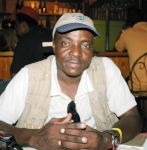by Guy Delva
For New Pittsburgh Courier
PORT-AU-PRINCE (NNPA)—Many Haitians are still in desperate straits—and some even say they feel forgotten—as they crave for food, shelter and other basic needs two months after a devastating earthquake left more than 220,000 people dead in the Caribbean country that is now struggling to recover from the disaster and to rebuild.
“I pray every day for someone to give me a tent. I have 5 children, including a 7 month-old. When it rains everybody gets wet,” said Joceline Magloire, 37. “This situation is unbearable. I heard that a lot of people are collecting money on behalf of Haiti. Why don’t they buy those tents and ship them to us here,” she said angrily.
 |
| ON THE GROUND IN HAITI—Guy Delva, a native Haitian who is secretary general of the Haitian press group, SOS Journalists, is now an occasional Haiti correspondent for the NNPA News Service.
|
She called on the government and international agencies to urgently provide tents to protect them as the rainy season nears.
“It is true I need food, but what we really, really need now is a tent. Is anybody really hearing our call?” she asked.
Meanwhile, Haitian quake victims, including many carrying babies or nursing newborns, continue to live under makeshift tents that can help protect them from the sun but not from rains. The Haitian government and several NGOs said they have distributed several dozen thousand tents and plastic sheets but many more are yet to be reached.
Many living in those camps sometimes have to take to the streets in the middle of the night in order to secure good positions in long lines of people desperately looking for food at distribution sites.
Marlene Duvernus, a 34-year-old 8-month pregnant woman, marched at 2 a.m. last Thursday among a group of about 40 people in the streets of Petion-Ville, an upscale suburb of the metropolitan area of the capital Port-au-Prince, heading toward the police academy some three kilometers away, on Route Freres, seeking a food ration.
“I am 8-month pregnant. I have to walk a long way and am not feeling well but I have to go there to try to find something to eat,” Duvernus, whose husband died in the disaster, told NNPA as she walked—her right hand holding her belly. “Otherwise, I am going to die,” she said.
Government and Aid agencies have decided to hand out food supplies only to women to avoid jostles and clashes that usually occur when food is being distributed to both men and women at the same time. But many often lack means to take the food home if given for instance a bag of rice.
“I am not sure whether I’ll find food today. But if I find, I am not sure how I’ll take it home. I hope somebody will help me,” Duvernus said as she held a coupon distributed by the Petion-Ville Mayor Claire Lydie Parent.
The World Food Program says it has distributed food to nearly 500,000 people since the magnitude-7 earthquake devastated the Haitian capital and the southern provincial areas of Jacmel, Leogane and Petit-Goave.
WFP spokesman Fredrique Pierre said relief operations will continue in a more selective and targeted manner to ensure that aid beneficiaries are reaching those who need it the most.
“In the first phase, we tried to distribute to as many people as we could. But now we want to use a system that helps us identify those who have already received to make sure we assist those who are really in the need,” Pierre said.
Pierre said the UN agency has done and is doing all it possibly can to assist the needy population but recognized that scores of quake victims are yet to be reached in what he called the biggest and most complex operation the WFP has ever conducted.
The Haitian government has been complaining that it had not been in control of operations on the ground and that all the aid was going through non-governmental agencies, which often act on their own, regardless of the Haitian government’s directives and priorities.
“We are not even demanding that we handle all the money, all the assistance. Of course we would not have been able to do it alone because we don’t have the logistics…” Haitian Prime Minister Jean-Max Bellerive said in a recent interview.
“What we say is that the government should be aware of how much money was given to who, to do what and where, so that we may be able to check what is really going on on the ground,” he stated.
Haitian President Rene Preval also says the government is doing all it can, but he indicated that the government does not have the means to respond as it should and that it is working closely with the international community as the country tries to recover and rebuild.
Dozens of representatives of the government, professional groups and other civil society organizations have been very busy working on a reconstruction plan that will be discussed during a donor conference in New York on March 31.
Experts say Haiti will need billions of dollars to rebuild, but Haitian authorities hesitate to talk about specific figures as they continue to evaluate the situation.